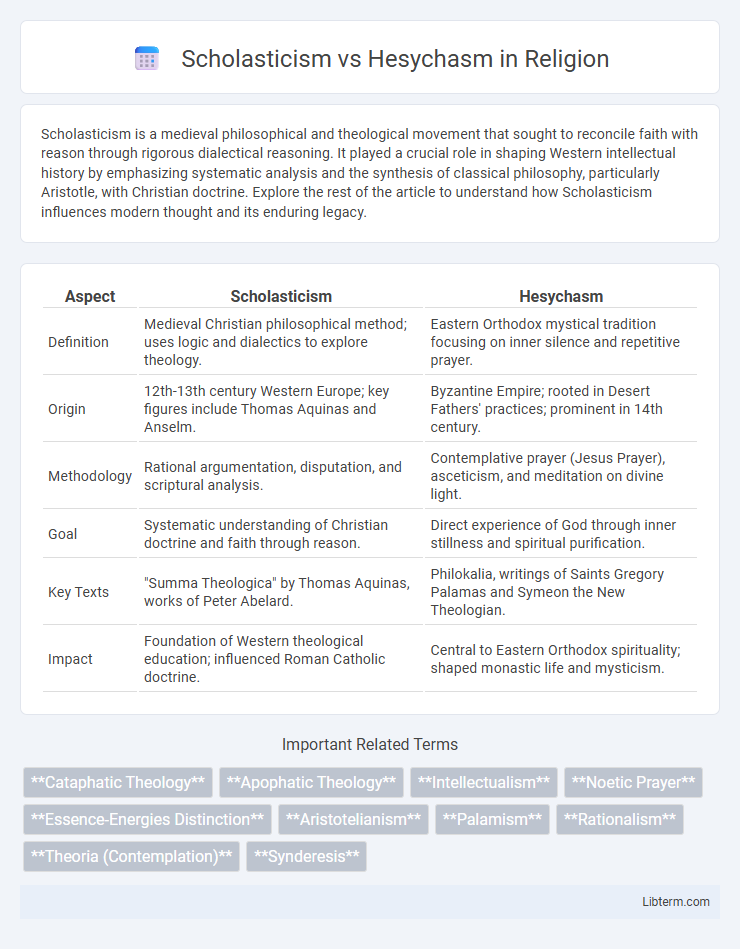Scholasticism is a medieval philosophical and theological movement that sought to reconcile faith with reason through rigorous dialectical reasoning. It played a crucial role in shaping Western intellectual history by emphasizing systematic analysis and the synthesis of classical philosophy, particularly Aristotle, with Christian doctrine. Explore the rest of the article to understand how Scholasticism influences modern thought and its enduring legacy.
Table of Comparison
| Aspect | Scholasticism | Hesychasm |
|---|---|---|
| Definition | Medieval Christian philosophical method; uses logic and dialectics to explore theology. | Eastern Orthodox mystical tradition focusing on inner silence and repetitive prayer. |
| Origin | 12th-13th century Western Europe; key figures include Thomas Aquinas and Anselm. | Byzantine Empire; rooted in Desert Fathers' practices; prominent in 14th century. |
| Methodology | Rational argumentation, disputation, and scriptural analysis. | Contemplative prayer (Jesus Prayer), asceticism, and meditation on divine light. |
| Goal | Systematic understanding of Christian doctrine and faith through reason. | Direct experience of God through inner stillness and spiritual purification. |
| Key Texts | "Summa Theologica" by Thomas Aquinas, works of Peter Abelard. | Philokalia, writings of Saints Gregory Palamas and Symeon the New Theologian. |
| Impact | Foundation of Western theological education; influenced Roman Catholic doctrine. | Central to Eastern Orthodox spirituality; shaped monastic life and mysticism. |
Introduction to Scholasticism and Hesychasm
Scholasticism, emerging in medieval Europe, emphasizes rigorous dialectical reasoning and systematic theology to reconcile faith with Aristotelian philosophy. Hesychasm, rooted in Eastern Orthodox spirituality, centers on contemplative prayer and the experiential union with God through inner stillness and the repetitive Jesus Prayer. Both traditions represent profound approaches to understanding divine truth, one through intellectual inquiry and the other through mystical practice.
Historical Background and Origins
Scholasticism emerged in medieval Europe during the 12th century, rooted in the revival of Aristotelian philosophy and the establishment of medieval universities, aiming to reconcile faith and reason through systematic theological analysis. Hesychasm originated in the 14th-century Eastern Orthodox Church, particularly on Mount Athos, emphasizing contemplative prayer and inner stillness as a means to experience the uncreated light of God. Both movements reflect distinct spiritual and intellectual responses to theological challenges within Western and Eastern Christianity, shaped by their unique cultural and historical contexts.
Core Philosophical Foundations
Scholasticism centers on the synthesis of faith and reason, emphasizing systematic theology and Aristotelian logic to explore divine truths and natural philosophy. Hesychasm focuses on experiential spirituality through contemplative prayer and inner stillness, aiming for direct union with God and theosis. While Scholasticism prioritizes intellectual analysis, Hesychasm emphasizes mystical practice as the path to divine knowledge.
Key Theological Differences
Scholasticism emphasizes rigorous dialectical reasoning and systematic theological synthesis rooted in Aristotelian philosophy, while Hesychasm centers on contemplative prayer and the experiential knowledge of God through inner stillness and the Jesus Prayer. Theologically, Scholasticism prioritizes rational demonstration of God's existence and attributes, contrasting with Hesychasm's focus on theosis, or union with God, through mystical experience. Scholastic method relies on intellectual abstraction, whereas Hesychasm stresses direct, non-conceptual illumination of divine grace.
Methods of Knowledge Acquisition
Scholasticism emphasizes deductive reasoning and dialectical methods to acquire knowledge, relying heavily on logical analysis of authoritative texts, particularly those of Aristotle and Christian theology. Hesychasm centers on experiential knowledge obtained through contemplative prayer and inner stillness, fostering a direct, mystical encounter with the divine beyond rational discourse. The contrast lies in Scholasticism's systematic intellectual inquiry versus Hesychasm's introspective, spiritual practice as paths to truth.
Role of Reason vs. Mystical Experience
Scholasticism emphasizes the primacy of reason and logical analysis to understand theological truths, relying heavily on Aristotelian philosophy and systematic debate. Hesychasm centers on mystical experience and inner prayer, advocating for direct, experiential knowledge of God through contemplation and spiritual stillness. The tension between these traditions highlights the contrast between intellectual inquiry and intuitive, mystical union in the pursuit of divine understanding.
Major Proponents and Influential Figures
Scholasticism was shaped by major proponents like Thomas Aquinas, Peter Abelard, and Duns Scotus, who emphasized dialectical reasoning and systematic theology within the Western medieval university tradition. Hesychasm's influential figures include Gregory Palamas, whose defense of theoria and the Jesus Prayer deeply impacted Eastern Orthodox spirituality and theology in the 14th century. These key figures not only advanced their respective spiritual and intellectual traditions but also defined the theological discourse between Western scholasticism and Eastern mystical practices.
Impact on Western and Eastern Christian Thought
Scholasticism profoundly shaped Western Christian thought by emphasizing systematic theology, dialectical reasoning, and the harmony of faith with reason, influencing medieval universities and Catholic doctrine. Hesychasm, rooted in Eastern Orthodox mysticism, centered on inner prayer and experiential knowledge of God, emphasizing spiritual contemplation and theosis as the path to divine union. The contrasting methodologies led to divergent theological priorities: Scholasticism advanced intellectual rigor in Western Christianity, while Hesychasm fostered mystical spirituality in Eastern Christianity.
Lasting Legacies in Modern Theology
Scholasticism's lasting legacy in modern theology is evident through its rigorous use of reason and systematic inquiry, shaping contemporary Christian philosophical frameworks and ethical debates. Hesychasm profoundly influences modern spiritual theology by emphasizing contemplative prayer and inner stillness, inspiring practices within Eastern Orthodox traditions and beyond. Both traditions continue to inform theological discourse, with Scholasticism driving doctrinal precision and Hesychasm nurturing mystical experience and spiritual renewal.
Comparative Analysis: Scholasticism vs Hesychasm
Scholasticism emphasizes rigorous dialectical reasoning and systematic theology rooted in Aristotelian philosophy, while Hesychasm prioritizes experiential knowledge of God through contemplative prayer and inner stillness. Scholasticism develops complex theological arguments within academic frameworks, contrasting with Hesychasm's mystical approach centered on the Jesus Prayer and the pursuit of divine quietude. The comparative analysis reveals Scholasticism's intellectual synthesis of faith and reason versus Hesychasm's focus on direct, transformative spiritual experience.
Scholasticism Infographic

 libterm.com
libterm.com